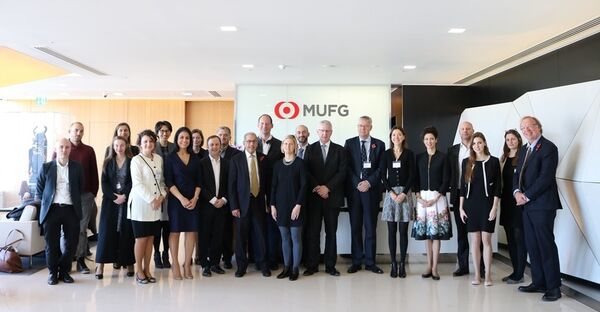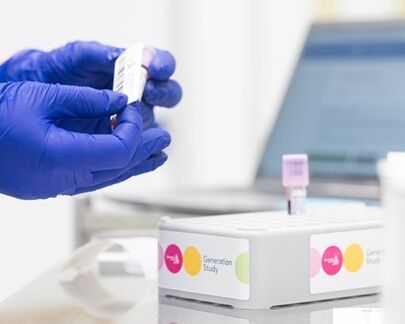A platform for progress – driving genomic vision, research, innovation and outcomes – a blog from Joanne Hackett

Joanne Hackett, Genomics England Chief Commercial Officer, explores how November’s 4th Discovery Forum is helping to shape a genomics vision, research, innovation and outcomes.
Forum members come together at the MUFG sponsored breakfast session.
Back in the summer I spoke of my pride in the Discovery Forum’s progress just a year after its inception. In this blog, I want to demonstrate what this really means in practice.
The Forum came together on 8 November with a truly heavyweight agenda. As I’ve said before, this isn’t a talking shop, but a powerful platform to deliver on the promise of genomic medicine – both for patients and the economy.
It was an agenda that looked at a developing genomics vision, real-world research opportunity, the potential to foster innovative industry and emerging outcomes.
Vision
As we rapidly approach the sequencing of the 100,000th genome and the completion of Genomics England’s genuinely historic ‘first phase’ – NHS England’s Chief Scientific Officer, Professor Dame Sue Hill, and our Chief Scientist, Professor Mark Caulfield, discussed the next ‘new horizon’.
This was heralded by the Secretary of State for Health and Social Care, Matt Hancock, on 2 October. He outlined the roadmap that will take us from 100,000 genomes to a million – and beyond. It’s an exciting vision built on a tremendous achievement: in a little more than 5 years, Genomics England has scaled genomics into a global sector and supported NHS England in delivering its world-leading Genomics Medicine Service (GMS).
Research
Sessions on collaboration saw representatives come together from across the genomics space – including data companies, our own GeCIP research initiative and the charity sector – to see how we can improve the ways we mine data to yield discovery.
David Dexter, Deputy Director of Research at Parkinson’s UK, presented to the Forum on the power of collaborations between academia, industry, patient groups and charities to realise the potential of genomic medicine – and support smarter and more effective clinical trials. A key theme was the need to integrate different datasets – including imaging, clinical and genomics data – to help drive stratification and personalised approaches.
Taking this collaborative theme forward, discussions also covered progress in the Genomics England Clinical Interpretation Partnership (GeCIP) – and the emerging cross-cutting opportunities this offers.
Tying the collaborative theme together, we heard from companies that are focused on how to integrate data sources and derive maximum impact. Artificial intelligence (AI) specialist NVIDIA presented on the opportunities of deep learning and data engineering. IQVIA explored the development of a platform to better-connect clinical and de-identified genomics data. The objective of the platform is to deliver robust evidence that fuels faster and more efficient drug research – which will, in turn, accelerate discoveries and their translation into routine genomic treatments.
Innovation industry
The next link in the genomics chain is the development of innovative start-ups to fully harness the medical value of data.
The Francis Crick Institute’s Veronique Birault spoke to the Forum about its KQ Labs programme – aimed at accelerating high growth start-ups in the data-focused biomedical sector. KQ Labs offers fast-emerging companies real-world support, with financial grants backed by an ecosystem of global experts, covering areas that include entrepreneurship, the health sector, data science and investment.
Carrying this forward, discussion then moved on to how the Forum can support this and other initiatives – as well as start-ups themselves. Members heard from innovative, genomics-focused companies including Lifebit, Pangaea, Sevenbridges, Alexion, Mendelian, Sensyne Health and Repositive.IO.
And of course, funders were here too – with the presence of innovation specialist MUFG, which gave financial focus and insight to discussions.
Outcomes
All of this activity is hugely positive, but leaves out the final link – outcomes. So it was hugely encouraging to see rare disease-focused biopharma Forum members Alexion and BioMarin present on progress they had made using selected and de-identified data from the Genomics England dataset.
Alexion and BioMarin have identified previously undiagnosed patients with life threatening kidney (CLN2) and neurological (nephronophthisis) conditions respectively. Their work is important because, in identifying the exact cause of these conditions, there are opportunities to develop ever more effective and targeted treatments – which may delay their progression or even prevent the disease.
The November Discovery Forum was genuinely meaningful – and is helping to shape activity as we move along the genomic roadmap. Its collaborative and inclusive approach means we are able to explore genomics holistically – making it a real platform for progress. I can’t wait to see where the next Discovery Forum will take us.


